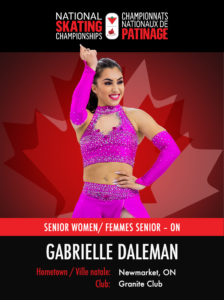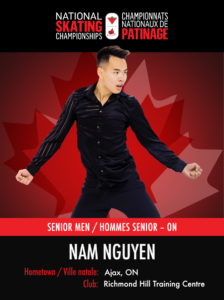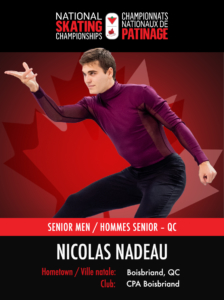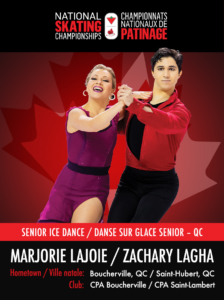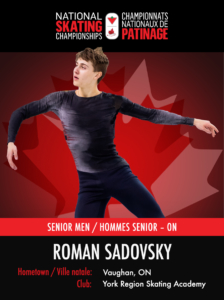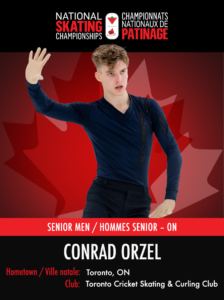Pride Profile: “How far we’ve come and how far we’ve yet to go”
June is Pride Month and an opportunity to highlight and celebrate the LGBTQI2S+ community. Skate Canada has done and is continuing to do substantive work in relation to LGBTQI2S+ inclusion but we know there remains critical inclusion work to be done moving forward in relation to race, ethnicity, Indigeneity, religion, class, size, and ability, and their intersections.
To support an inclusive environment this Pride Month we are sharing personal stories from our skating community. Below is the story of HM.
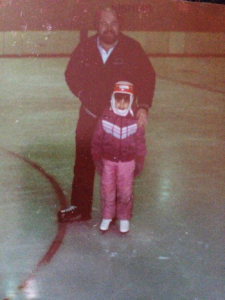 I started out in skating after watching the 1988 Olympics and insisting to my mother that I wanted to ‘fancy skate’. Being the supportive and encouraging parents they are, my parents put me in recreational lessons then into CanSkate, where I quickly fell in love with our sport.
I started out in skating after watching the 1988 Olympics and insisting to my mother that I wanted to ‘fancy skate’. Being the supportive and encouraging parents they are, my parents put me in recreational lessons then into CanSkate, where I quickly fell in love with our sport.
It was encouraged at our club to hire a private coach around the Novice I level of CanSkate, in the hopes of building a strong relationship with your private coach prior to moving up to Junior. I chose a fun loving yet serious man who pushed me hard at a young age and insisted on my best effort at all times. I loved him dearly and was hopelessly attached by the end of the first lesson.
Sadly, this coach-skater relationship was ended before even a full year had passed. Despite many parents (including my own) and fellow coaches’ objections, his contract of many years was not renewed for the following year when the club board of directors somehow became aware of his sexuality. Being so young at the time, this was not shared with me, and it was years before anyone told me the truth. To this day I’m sure I’m missing some of the story, and I haven’t been able to track him down since. I do remember saying goodbye – I was in hysterics and my mom had to carry me to the car. She says he left crying, too.
I almost quit skating after that first summer. I remember my parents sitting me down to try and help me choose a new coach, to try and convince me to keep skating. I remember looking at the list of coaches, recognizing them all and being sure of none. I knew I wanted a coach who was firmer with their skaters, but I also knew I wanted a coach who would care about me at least half as much as my first coach had. In all honesty, I didn’t want a new coach, I wanted MY coach. In the end, we reached a compromise – I would skate until Christmas with my new coaches, and if I still didn’t want to skate anymore, I could quit then.
My new coaches were a husband and wife team. I chose them simply because they seemed strict; they were very no-nonsense and their skaters worked hard. On paper, their roles were very defined. He was my dance coach, with the odd free skate lesson thrown in here and there. She taught me figures and later skills, alongside the majority of all my free skate. The two of them became my second set of parents. Throughout many of my formative years, more waking hours were spent with them than with my parents. I was just as excited to tell them about my life as I was my parents and strove for as much, if not more, for their approval, praise and affection. I remember having a ‘3 things’ rule put in place in elementary school – I could tell them 3 things a day before having to focus on the lesson. I would tell them about school, my friends, my family, my life. I wanted to tell them everything. I loved them deeply and owe them a huge debt – without their efforts to win me over that first fall, I would have left skating, likely forever, and my life would have taken an entirely different course. We spent years together, from my first Preliminary tests through to double Gold. I passed my final Gold dances on my coach’s 55 birthday, and still have a collection of photos and a love of champagne from that day. I spent my teenaged summers at the arena for 8+ hour days, biking an hour to and from the arena in order to be able to spend as much time possible there with them skating, training and helping anywhere they would let me. I was given opportunities, responsibilities and a deep sense of belonging and acceptance that made the arena the place in the world I felt I fit best without knowing why I already felt “different”. I was blessed to have had a great relationship with them that built a large part of who I am today, as both a coach and a person.
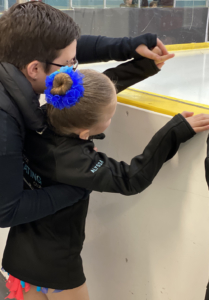 I was in eleventh grade before I came out to myself and began coming out to others. After witnessing other friends experience rejection from their adult mentors, teachers and coaches I wasn’t sure I could survive it if it happened to me and couldn’t risk it with mine. This comes across as dramatic, but in truth was probably pretty spot on. I made the decision to change coaches to a younger, less experienced coach in order to not feel any possible negative (or perceived negative) reaction as acutely. To avoid any disappointment in myself as a person from people whose respect I couldn’t stand to lose. In effect, and to my own skating’s detriment, at the end of my personal skating career, I abandoned them before they could me. To be clear, I didn’t have an inkling of how they’d react. I just couldn’t muster up the courage to risk them finding out. I remember my female coach hiding her tears and thinking that at least she was disappointed in me for something I chose rather than something I couldn’t. I remember the last hug from both of them and running out of the arena sobbing hysterically – I knew I’d made a huge mistake but I wasn’t willing to rethink my decision because it was still easier than the alternative that might never and probably wouldn’t have happened anyway. Both of them left our club very suddenly immediately afterwards, moving full time to the other club they taught at. They had been staying until I graduated and moved on; I was their ‘last’ at our club. When I left them, they left, too.
I was in eleventh grade before I came out to myself and began coming out to others. After witnessing other friends experience rejection from their adult mentors, teachers and coaches I wasn’t sure I could survive it if it happened to me and couldn’t risk it with mine. This comes across as dramatic, but in truth was probably pretty spot on. I made the decision to change coaches to a younger, less experienced coach in order to not feel any possible negative (or perceived negative) reaction as acutely. To avoid any disappointment in myself as a person from people whose respect I couldn’t stand to lose. In effect, and to my own skating’s detriment, at the end of my personal skating career, I abandoned them before they could me. To be clear, I didn’t have an inkling of how they’d react. I just couldn’t muster up the courage to risk them finding out. I remember my female coach hiding her tears and thinking that at least she was disappointed in me for something I chose rather than something I couldn’t. I remember the last hug from both of them and running out of the arena sobbing hysterically – I knew I’d made a huge mistake but I wasn’t willing to rethink my decision because it was still easier than the alternative that might never and probably wouldn’t have happened anyway. Both of them left our club very suddenly immediately afterwards, moving full time to the other club they taught at. They had been staying until I graduated and moved on; I was their ‘last’ at our club. When I left them, they left, too.
I never made amends with either of them. A few years later I would run into them regularly at competitions with my own skaters throughout our section. While always cordial and polite, we never even came close to reconciling. I respect and love them both even still and I think the hurt I caused them was far worse than any negative reaction I could have ever had to live through, especially since to this day neither of them has any idea of the true reasons I chose to spend my final year of skating with someone else. I hope if either of them sees this almost 20 years later, they can forgive me for any hurt I caused them and know how valued, important and loved they were and are.
I now coach across the country from where I grew up, at a small club with young competitive athletes who have very big dreams. I am out in my everyday life and the majority of the families I work with are aware of my sexuality and my partner is welcomed at events such as award ceremonies and as a volunteer when appropriate. Though my technique has changed over the years, I find my coaching style is extremely similar to that of my past coaches. I often wonder how they would have reacted had they known the truth.
Pride month brings forward how far we’ve come and how far we’ve yet to go. Personally, I feel the olive branches extended during this month often fall short as the seasons change but with new initiatives, follow through and education, we can make sure that our athletes, coaches, members and volunteers are happy, supported and secure in their places within our organization.
Happy Pride, Skate Canada.
Skate Canada thanks to HM for sharing their story and bringing awareness to the skating community. If you are a member of the LGBTQI2S+ skating community and are interested in sharing your personal story please send us an email at [email protected].


